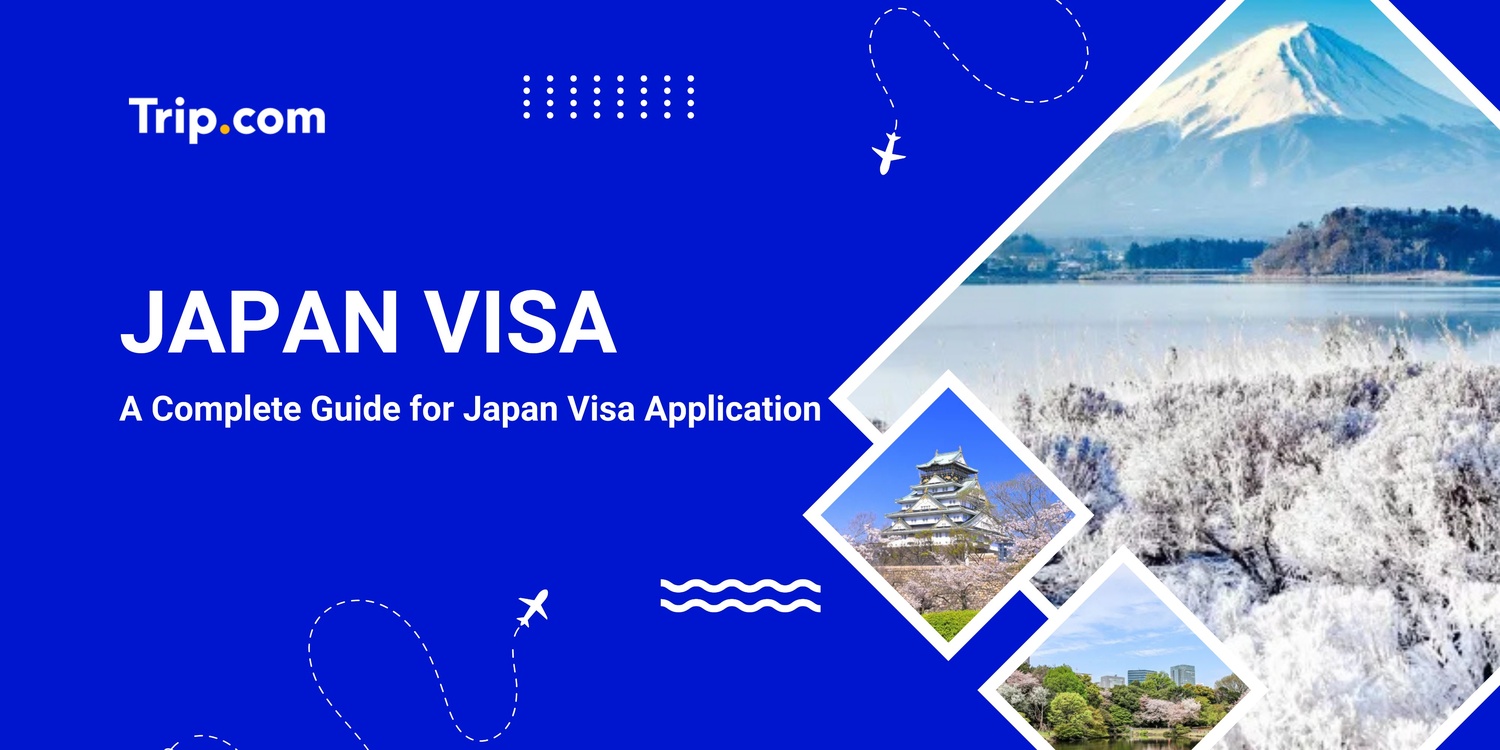
Japan is a captivating destination where ancient traditions meet cutting-edge technology. The neon-lit streets of Tokyo offer a vibrant city experience, while serene temples like Kyoto’s Kinkaku-ji and Nara’s Todai-ji provide a peaceful escape into history. Mount Fuji’s majestic peak and the hot springs of Hakone provide breathtaking natural beauty. Visitors can enjoy the country’s world-renowned cuisine, from sushi and ramen to street food delights, while immersing themselves in unique cultural experiences like tea ceremonies and sumo wrestling. With its harmonious blend of past and future, Japan invites travelers to explore its rich culture, modern marvels, and picturesque landscapes.
What is a Japan Visa?
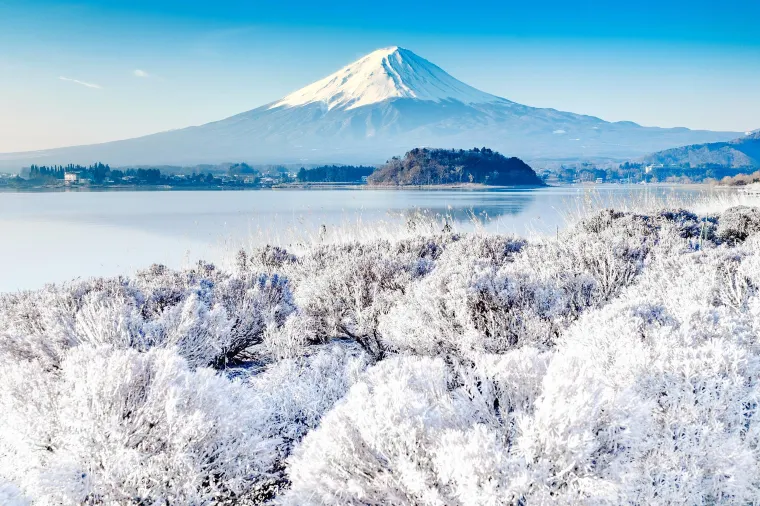
A Japan visa is an official endorsement or stamp issued by an authorized visa agency or the Japanese government on the passport or travel documents of foreign nationals seeking to enter, exit, or transit through Japan. It grants permission for the visa holder to visit Japan for various purposes, such as tourism, business, work, or study.
This article will guide you through the different types of Japan visas, the application process, associated fees, processing times, and more.
Types of Japan Visa
1. Working Visas
These visas are designed for individuals intending to engage in professional activities that require specialized knowledge or skills. Common categories include:
- Engineer / Specialist in Humanities / International Services: For professionals in fields such as engineering, law, economics, social sciences, translation, interpretation, language instruction, public relations, international trade, fashion design, interior design, and product development. Applicants typically need a university degree in the relevant field or significant professional experience.
- Intra-company Transferee: For employees of foreign companies who are being transferred to their company's branch or subsidiary in Japan. Applicants must have worked at the overseas office for more than one year.
- Skilled Labor: For individuals with expertise in specific trades such as foreign cooking, architecture, civil engineering, precious metal processing, animal training, piloting aircraft, sports instruction, or sommelier services. Applicants generally need 3–10 years of professional experience in the respective field.
- Business Manager: For individuals starting or investing in a business in Japan or managing a business on behalf of other investors. Requirements include a physical, dedicated office space in Japan and a minimum investment of 5 million yen for new applications. For renewals, the business should have 10 million yen in sales and 5 million yen in expenses.
- Highly Skilled Professional: Introduced to attract individuals likely to contribute to Japan's economy. Applicants are awarded points based on factors such as educational background and professional experience. Those scoring 70 points or more may be eligible for this visa.
2. Non-Working Visas
These visas are for individuals who do not intend to engage in remunerated activities during their stay in Japan. Categories include:
- Temporary Visitor: For tourism, vacation, sports, family visits, participation in seminars, conferences, or reunions. This visa allows short-term stays without the right to work.
- Cultural Activities: For individuals participating in cultural or artistic activities that provide no income. This includes studies or research of Japanese cultural or artistic activities.
- Designated Activities: For activities specifically designated for each case, such as housekeepers for diplomats, students on internships, working holidays, or long stays for sightseeing and recreation.
3. Family-Related Visas
These visas are granted based on family status and typically allow the holder to work in any field or industry without restrictions. Categories include:
- Spouse or Child of Japanese Nationals: For foreign nationals married to Japanese citizens or children of Japanese nationals.
- Long-Term Residents: For individuals with special circumstances, such as refugees, descendants of Japanese nationals, or those caring for children with Japanese nationality.
- Permanent Residents: For individuals who have resided in Japan for a certain period and meet specific criteria. This visa allows indefinite stay and work rights.
Visa-Free Countries and Regions for Japan
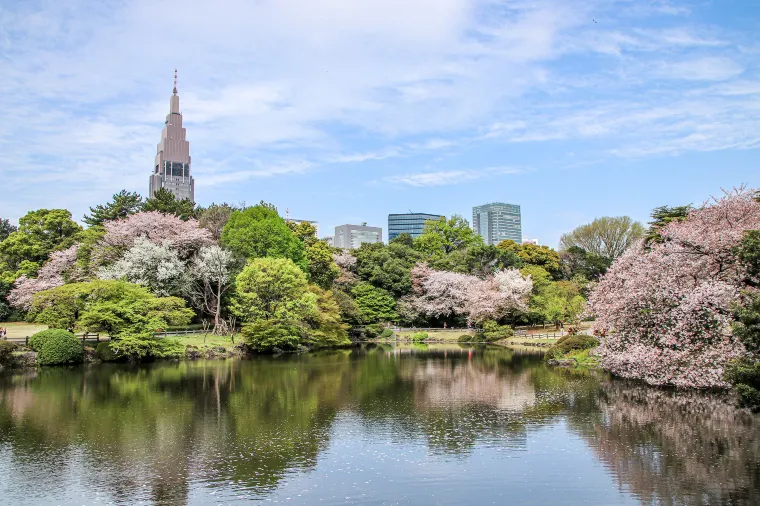
Singaporeans do not acquire a visa for up to 90 days stay.
| Region | Country/Region | Visa-Free Duration |
|---|---|---|
Asia | Thailand | 90 days |
South Korea | 90 days | |
Philippines | 59 days | |
Singapore | 90 days | |
Indonesia | 30 days | |
Malaysia | 90 days | |
Hong Kong | 90 days | |
Macau | 90 days | |
Taiwan | 90 days | |
Europe | United Kingdom | 180 days |
Germany | 90 days | |
France | 90 days | |
Italy | 90 days | |
Netherlands | 90 days | |
Belgium | 90 days | |
Spain | 90 days | |
Sweden | 90 days | |
Finland | 90 days | |
Norway | 90 days | |
Greece | 90 days | |
Austria | 90 days | |
Switzerland | 90 days | |
Poland | 90 days | |
Americas | United States | 90 days (Visa Waiver Program) |
Canada | 90 days | |
Brazil | 90 days | |
Mexico | 90 days | |
Oceania | New Zealand | 90 days |
Fiji | 90 days | |
Samoa | 60 days | |
Vanuatu | 90 days | |
Solomon Islands | 90 days | |
Palau | 30 days | |
Africa | South Africa | 90 days |
Botswana | 90 days | |
Mauritius | 90 days |
Validity and Duration of Stay for Japan Visa
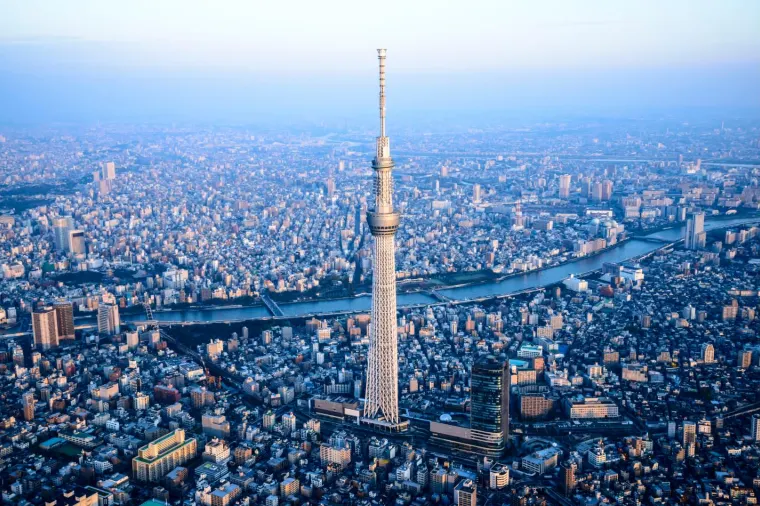
1. Working Visas
Engineer / Specialist in Humanities / International Services:
- Validity: Typically 1–3 years, depending on the employment contract and visa renewal.
- Duration of Stay: Applicants can stay for the duration of the visa’s validity, which can be renewed based on continued employment in Japan.
Intra-company Transferee:
- Validity: Usually 1–5 years, depending on the transfer arrangement and the employee's contract.
- Duration of Stay: Initially granted for 1–3 years, with the possibility of extension based on the transfer's terms.
Skilled Labor:
- Validity: 1–5 years, depending on the job and contract length.
- Duration of Stay: Generally 1–3 years, renewable based on continued work in Japan and employer’s approval.
Business Manager:
- Validity: Typically 1–3 years, with the possibility of extension based on business performance and investment criteria.
- Duration of Stay: The visa is tied to the business's operations and may be renewed based on business growth and income levels.
Highly Skilled Professional:
- Validity: Generally 1–5 years.
- Duration of Stay: Typically granted for 1–3 years, with possible extensions or permanent residency options based on points scored and contribution to Japan's economy.
2. Non-Working Visas
Temporary Visitor:
- Validity: Usually 90 days.
- Duration of Stay: Visitors can stay for up to 90 days in Japan for tourism, family visits, or other non-remunerated activities. Extensions are typically not allowed, but a new application may be made if needed.
Cultural Activities:
- Validity: Generally 1 year.
- Duration of Stay: The visa can be issued for the duration of the activity, and typically lasts for 1 year. Extensions may be possible depending on the activity's progress.
Designated Activities:
- Validity: Varies based on the specific activity, from 1 month to 1 year.
- Duration of Stay: Depending on the activity, it can be issued for the duration of the activity, typically 1–6 months. Extensions may be available if the activity continues.
3. Family-Related Visas
Spouse or Child of Japanese Nationals:
- Validity: 1–3 years, depending on the relationship and circumstances.
- Duration of Stay: Stay duration typically corresponds to the relationship status (e.g., married couples) and can be extended upon renewal of the visa.
Long-Term Residents:
- Validity: 1–3 years or more, depending on individual circumstances.
- Duration of Stay: This can be indefinite, depending on the individual’s specific case (e.g., refugee status, or family reunification).
Permanent Residents:
- Validity: Permanent.
- Duration of Stay: No time limit. Once granted, this visa allows indefinite stay in Japan with full work rights.
Recommended Hotels in Tokyo
Requirements for Applying for a Japan Visa
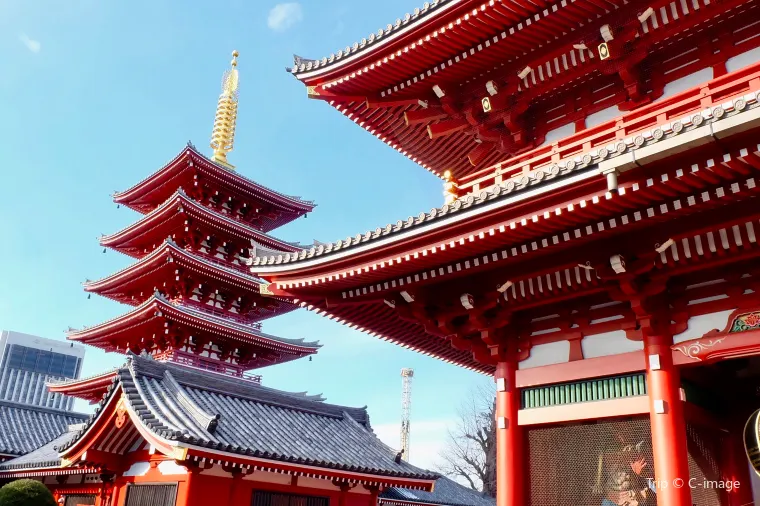
1. Working Visas
These visas are for foreign nationals intending to work in Japan in specialized fields. The required documents depend on the type of working visa.
General Requirements:
- Valid Passport: A passport valid for at least 6 months.
- Visa Application Form: Completed and signed visa application form.
- Passport-sized Photograph: A recent, color photo (usually 4.5 cm x 3.5 cm).
- Visa Fee: Payment as per the visa type.
Additional Requirements Based on Visa Type:
- Engineer / Specialist in Humanities / International Services:
- Proof of university degree or equivalent qualifications.
- Employment contract from a Japanese company or employer.
- A letter from the employer detailing the role and job description.
- Intra-company Transferee:
- Employment contract from the parent company abroad.
- Proof of at least one year of continuous employment at the overseas office.
- Skilled Labor:
- Proof of professional experience (3–10 years) in the relevant field.
- Employment contract from a Japanese employer.
- Business Manager:
- Business plan for starting or investing in a company in Japan.
- Proof of financial stability, such as proof of investment (at least 5 million yen).
- Company registration documents for the business in Japan.
- Highly Skilled Professional:
- Points-based assessment (details about education, work experience, salary, etc.).
- Professional qualifications and proof of contributions to Japan's economy.
2. Non-Working Visas
These visas are for foreign nationals visiting Japan for non-remunerated purposes such as tourism, cultural activities, or designated activities.
General Requirements:
- Valid Passport: A passport valid for at least 6 months.
- Visa Application Form: Completed and signed visa application form.
- Passport-sized Photograph: A recent color photo.
- Visa Fee: Payment as per visa type.
Additional Requirements Based on Visa Type:
- Temporary Visitor (Tourist Visa):
- Round-trip flight booking.
- Hotel reservation or accommodation details.
- Travel itinerary.
- Cultural Activities Visa:
- A letter of invitation from the cultural organization or institution.
- Proof of the applicant’s cultural or artistic background.
- Designated Activities Visa:
- Specific documentation related to the activity, such as internship agreement, housekeeper contract, or working holiday application.
3. Family-Related Visas
These visas are issued for family members of foreign nationals in Japan, such as spouses or children of Japanese citizens.
General Requirements:
- Valid Passport: Passport valid for at least 6 months.
- Visa Application Form: Completed and signed visa application form.
- Passport-sized Photograph: A recent, color photo.
- Visa Fee: Payment as per the visa type.
Additional Requirements Based on Visa Type:
- Spouse or Child of Japanese Nationals:
- Marriage certificate (for spouses) or birth certificate (for children).
- Proof of relationship (e.g., family registry for Japanese nationals).
- Proof of financial support (e.g., income certificates, bank statements).
- Long-Term Residents:
- Proof of special circumstances (e.g., refugee status, or family reunification).
- Permanent Residents:
- Proof of residence in Japan for a significant time period (usually 10 years or more).
- Proof of good behavior and contributions to Japanese society (e.g., tax records, community involvement).
Flights to Tokyo
How to apply for a Japan Visa
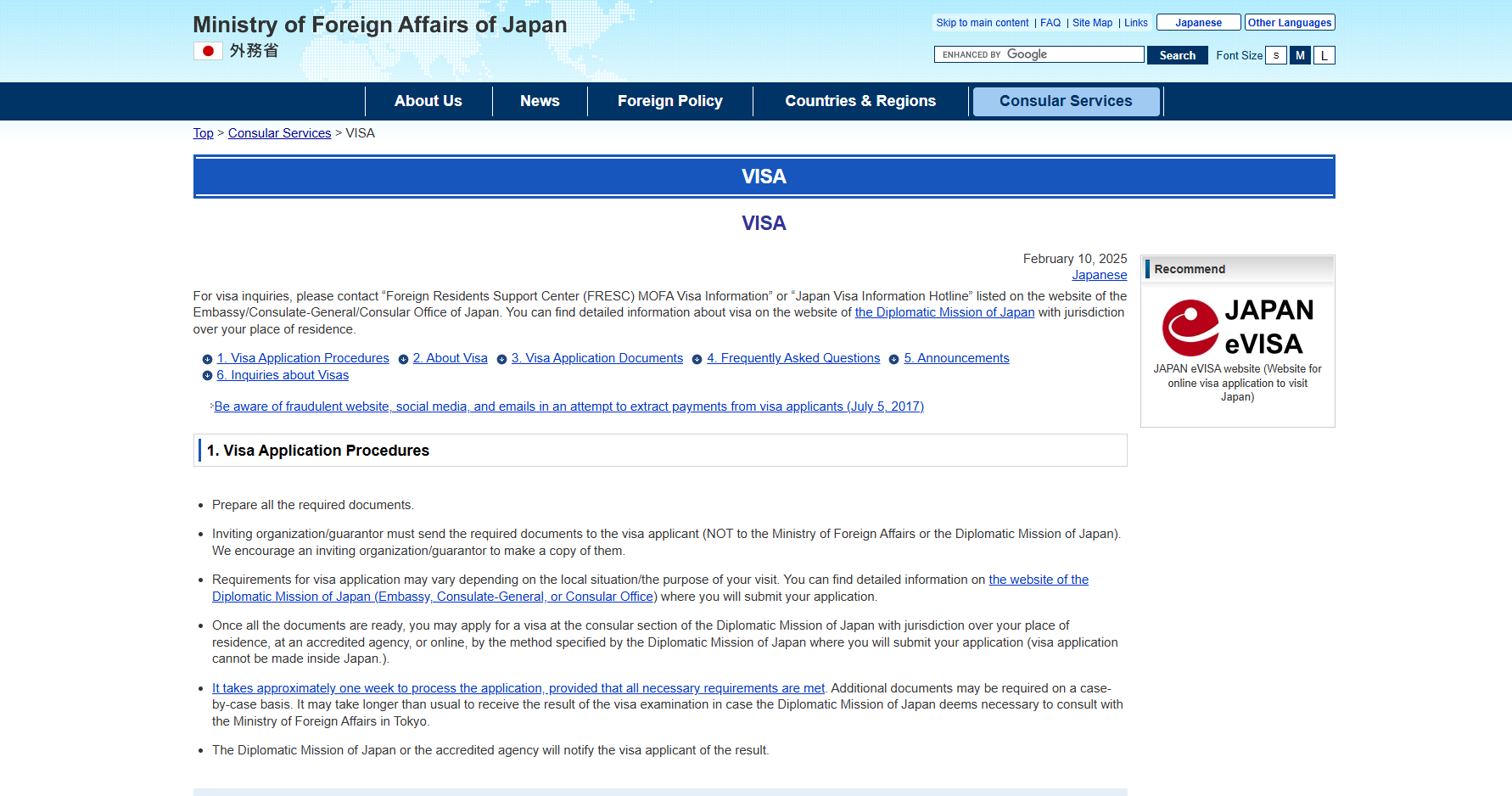
Image from Ministry of Foreign Affairs of Japan
1. Working Visas
These visas are for individuals intending to work in Japan in specialized fields. The application process varies depending on the specific work visa type.
General Steps:
- Determine the Type of Work Visa: Identify the type of visa based on your occupation (e.g., Engineer, Intra-company Transferee, Skilled Labor, Business Manager, Highly Skilled Professional).
- Prepare Required Documents:
- Valid Passport: At least 6 months valid.
- Visa Application Form: Complete the application form.
- Passport-sized Photograph: A recent color photo.
- Visa Fee: Pay the applicable visa fee.
- Additional Documents: Specific documents for each work visa category (e.g., job contract, professional qualifications, business plan).
- Submit Application to Japanese Embassy/Consulate:
- Submit your visa application form, passport, photo, and supporting documents to the nearest Japanese Embassy or Consulate.
- Wait for Processing:
- Processing time varies from 5–10 business days (for work visas).
- Collect Your Visa:
- If approved, collect your visa from the embassy or consulate. You may also be able to opt for mail delivery if available.
2. Non-Working Visas
These visas are for non-remunerated purposes such as tourism, cultural activities, or designated activities.
General Steps:
- Determine the Visa Type:
- Choose the visa type based on your purpose (e.g., Temporary Visitor, Cultural Activities, Designated Activities).
- Prepare Required Documents:
- Valid Passport: At least 6 months valid.
- Visa Application Form: Complete the application form.
- Passport-sized Photograph: A recent color photo.
- Visa Fee: Pay the applicable visa fee.
- Additional Documents: Supporting documents specific to your visa category (e.g., flight tickets, hotel bookings, invitation letter for cultural activities).
- Submit Application:
- Submit the completed application form and supporting documents to the Japanese Embassy or Consulate in your country.
- Wait for Processing:
- Processing time typically takes 5–10 business days for non-working visas.
- Collect Your Visa:
- Once approved, you can either pick up your visa from the embassy/consulate or opt for mail delivery, depending on the available services.
3. Family-Related Visas
These visas are for the family members (spouse, child, or dependent) of foreign nationals living in Japan.
General Steps:
- Determine the Type of Family Visa:
- Identify which family visa type applies to you (e.g., Spouse or Child of Japanese Nationals, Long-Term Residents, Permanent Residents).
- Prepare Required Documents:
- Valid Passport: At least 6 months valid.
- Visa Application Form: Complete the visa application form.
- Passport-sized Photograph: A recent color photo.
- Visa Fee: Pay the applicable fee.
- Additional Documents:
- For Spouse or Child of Japanese Nationals: Proof of relationship (e.g., marriage or birth certificate), financial support proof, family registry.
- For Permanent Residents: Proof of residence, tax records, and good behavior.
- Submit Application:
- Submit the visa application and supporting documents to the Japanese Embassy or Consulate.
- Wait for Processing:
- Processing time may vary, but it generally takes about 5–10 business days.
- Collect Your Visa:
- Upon approval, you will collect your visa either in person or via mail.
General Tips for All Japan Visa Applications:
- Visa Fees: Fees vary based on the type of visa and nationality.
- Documents: Ensure all documents are complete, correct, and certified (if required).
- Application Centers: In some countries, Japan visa applications can also be submitted through authorized visa application centers.
- Processing Times: Processing times may differ based on the embassy or consulate, so it’s always advisable to apply well in advance.
- Visa Extensions: If you are in Japan and wish to extend your stay, you will need to apply for an extension of stay at the immigration office before your current visa expires.
Japan Visa Fees for Singaporeans
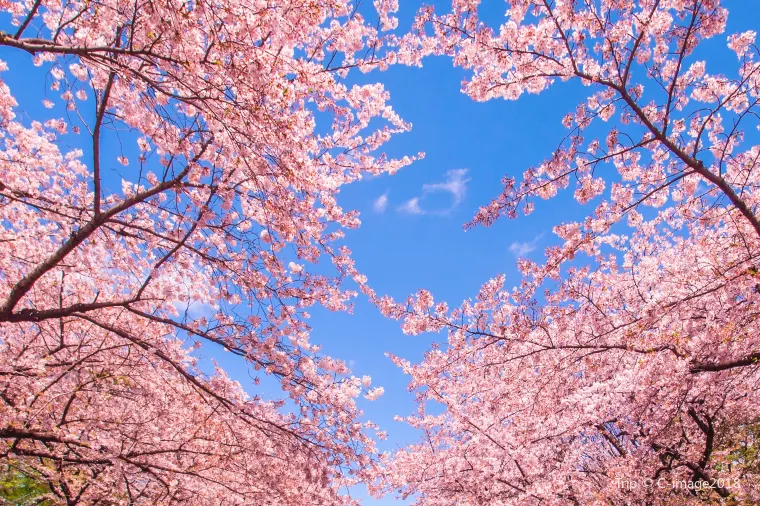
1. Visa Exemption
Singaporean passport holders enjoy visa-free entry to Japan for short-term stays of up to 90 days for purposes such as tourism, family visits, or unpaid activities. No visa application is required under this exemption.
2. Visa Fees for Long-Term or Work Visas
For stays exceeding 90 days, such as employment, study, or residency, Singaporeans must apply for a long-term visa. The application process involves obtaining a Certificate of Eligibility (COE) from Japan's immigration authorities. Once the COE is issued, applicants can submit their visa applications to the Japanese Embassy in Singapore.
Visa Application Fees:
- Single-entry visa: S$38
- Multiple-entry visa: S$75
Note: Fees are subject to change; please verify with the Japanese Embassy in Singapore before applying.
3. eVisa for Short-Term Tourism
Japan offers an eVisa for short-term tourism purposes (single-entry) to certain countries, including Singapore. Applicants can submit their applications and pay the visa fee online through the Japan eVisa system. Upon approval, the eVisa is issued electronically, eliminating the need for a physical visa sticker in the passport. Applicants must display the "visa issuance notice" on their device during check-in and immigration procedures.
eVisa Fee:
- Single-entry short-term stay (tourism): Approximately ¥3,000 (Japanese Yen)
Note: The eVisa system is available to Singaporean nationals and residents. Ensure to apply through the official Japan eVisa portal.
4. Application Submission and Processing
- Embassy Submission: Applications can be submitted to the Embassy of Japan in Singapore. Processing time is typically 5–10 working days.
- eVisa Application: Apply online through the Japan eVisa system. Processing times may vary; applicants will receive notifications via email upon approval.
How long does it take to apply for a japan visa?
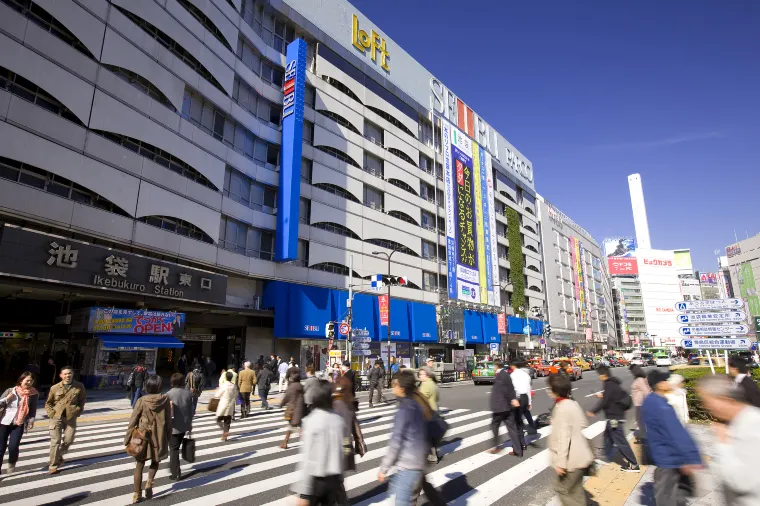
Embassy Visa Applications
- Standard Processing Time: Typically, it takes at least 5 working days to process a visa application submitted at the Embassy of Japan in Singapore, provided all required documents are in order.
- Referral Cases: In certain situations, applications may require referral to the government office in Japan. Such cases can take up to 2 months for approval.
- Appointment Requirement: Applications must be submitted by appointment only. Walk-ins are not accepted.



 NO.1
NO.1






